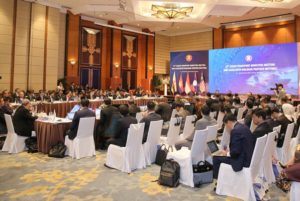 Transport ministers of the Association of Southeast Asian Nations (ASEAN) concluded and signed two air transport agreements and adopted transportation protocols during a series of meetings held in Hanoi, Vietnam last week.
Transport ministers of the Association of Southeast Asian Nations (ASEAN) concluded and signed two air transport agreements and adopted transportation protocols during a series of meetings held in Hanoi, Vietnam last week.
One of the agreements signed is the Protocol to Implement the Eleventh Package of Commitments on Air Transport Services under the ASEAN Framework Agreement on Services to liberalize air transport ancillary services in the region.
The other is Protocol 3 on the Expansion of Fifth Freedom Traffic Rights Between Contracting Parties of the ASEAN-China Air Transport Agreement. The agreement seeks to further enhance air connectivity between ASEAN and China to promote trade, tourism, investment, economic and social development.
The air transport deals are seen to integrate air transport in the region, moving towards the ambitious goal of a single aviation market.
A joint statement released at the Twenty-Fifth ASEAN Transport Ministers (ATM) Meeting held in Hanoi said the ministers also formally adopted a number of other documents.
Adopted was the Implementing Protocol-1: Qualification of Flight Simulation Training Devices (FSTD) of the Mutual Recognition Arrangement on Flight Crew Licensing to mutually recognize each other’s qualified FSTD.
Further, the ministers adopted the Implementation Framework of ASEAN Framework Agreement on Multimodal Transport (AFAMT). The adoption of the Implementation Framework of AFAMT would support operationalization of international multimodal transport and full implementation of AFAMT in the region through the use of a single multimodal transport contract for goods carried by different modes of transport.
The ministers also adopted the ASEAN Green Ship Strategy as part of ASEAN’s effort to curb climate change through reducing emissions from ships.
Meanwhile, the ministers commended the ongoing implementation of the ASEAN Air Traffic Management Master Plan to enhance air traffic management safety, efficiency, and capacity in the region, and to advance the Seamless ASEAN Sky.
They also supported work to align the master plan with the new edition of the International Civil Aviation Organization’s Global Air Navigation Plan and Asia/Pacific Seamless Air Navigation Services Plan.
The ministers lauded the notable progress in the Pilot Project on the Operationalization of the ASEAN Single Shipping Market, which will look at port clearance processes and focus on standardizing ship clearance documentation.
They also acknowledged the good progress in the air services negotiations with EU, Japan, New Zealand and Republic of Korea.
“The Ministers looked forward to the successful conclusion of the ambitious and mutually beneficial air transport / services agreements with dialogue partners that are over and above what has been achieved bilaterally, to expand air connectivity,” the statement said.
The ministers lauded the steady progress in the negotiations of the ASEAN-Japan Air Services Agreement and looked forward to the speedy conclusion of a more liberal and mutually beneficial deal.
With Korea, the ministers welcomed the successful finalization of the text of the ASEAN-Korea Air Services Agreement and pressed for its conclusion including a more liberal and mutually beneficial traffic rights exchange.
Also welcomed was the considerable progress in the negotiations on ASEAN-EU Comprehensive Air Transport Agreement as the ministers encouraged the conclusion of the ambitious agreement, which would be the first-region-to-region agreement of its kind.
Photo courtesy of ASEAN
